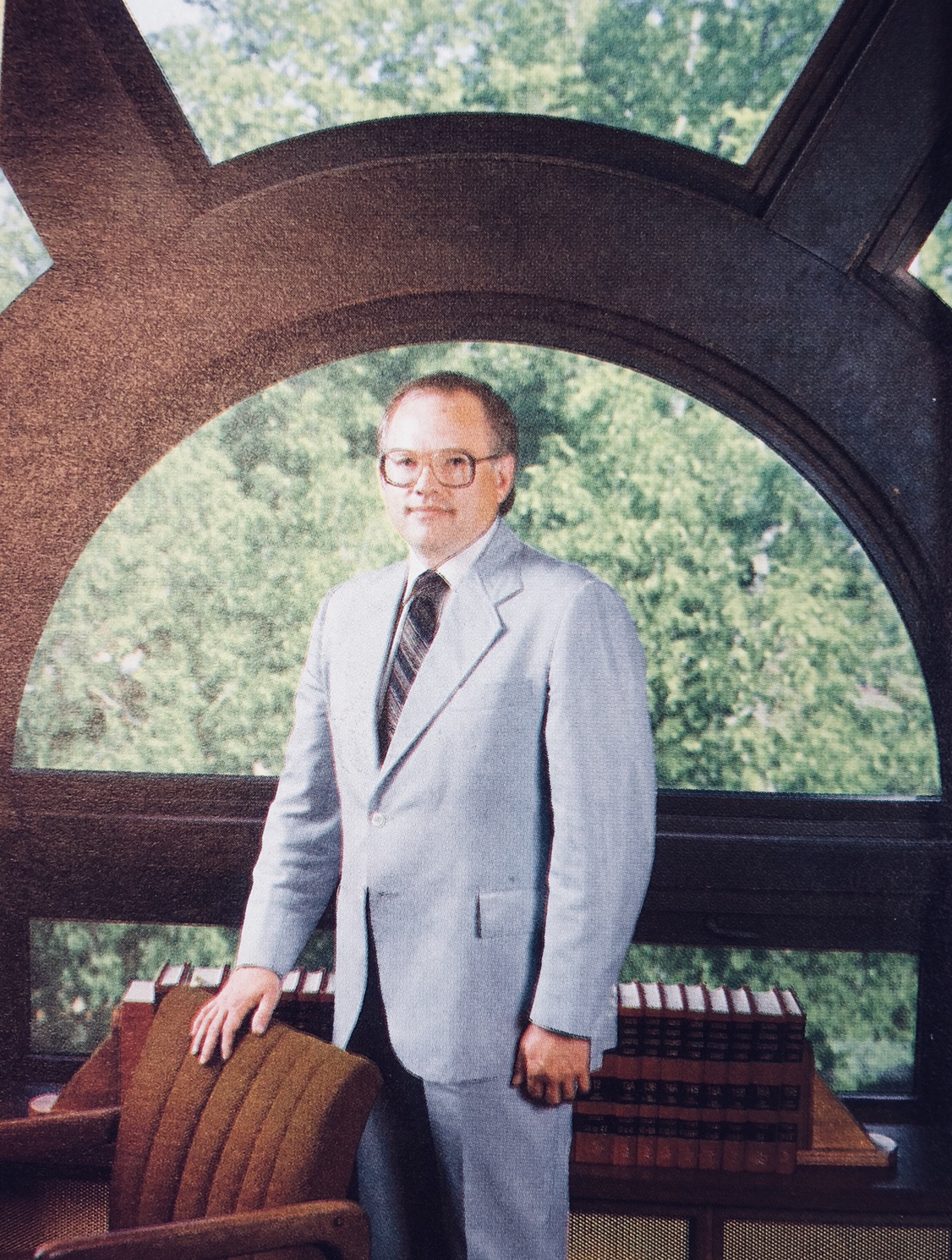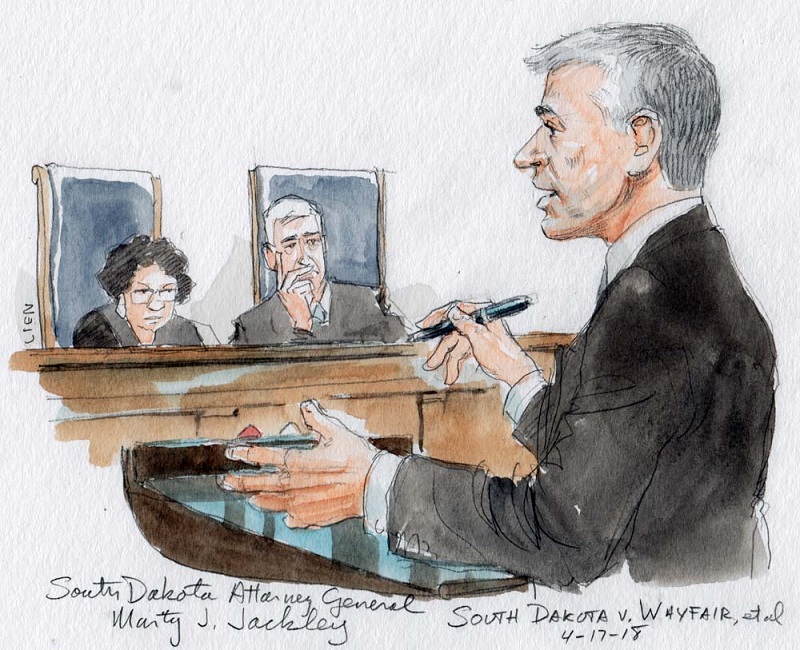Updated June 21, 2018 to reflect the State of South Dakota’s victory in South Dakota v. Wayfair, Inc.
On April 17, Attorney General Marty Jackley will argue on behalf of the State of South Dakota before the United States Supreme Court in South Dakota v. Wayfair, Inc. The case originates from a SB 106, which was passed by the State Legislature and signed by Gov. Daugaard in 2016. That law requires large out-of-state retailers to collect and remit sales tax. It is a direct challenge to Quill Corp. v. North Dakota, in which the U.S. Supreme Court required a physical nexus (presence) in order to require that sales tax be collected.
According to the excellent site Oyez, Jackley will be the sixth South Dakota attorney general to argue before the U.S. Supreme Court, and it will be the 14th appearance by an attorney general before the Court on South Dakota’s behalf. Below is a short look at the earlier cases:
William J. Janklow
South Dakota v. Opperman, 428 U.S. 364 (1976) – In Opperman, the U.S. Supreme Court upheld a warrantless search of a vehicle that had been impounded for a parking violation. Vermillion prohibited cars from being parked downtown overnight (in one can only assume was an effort to promote drunk driving). A care violating this prohibition was towed, and police searched the car when it was impounded, finding illegal drugs. Attorney General Bill Janklow won a 5-4 decision before the U.S. Supreme Court upholding the search. Later, however, the S.D. Supreme Court held suppressed the search on state constitutional grounds.
Rosebud Sioux Tribe v. Kneip, 430 U.S. 584 (1977) – Attorney General Janklow successfully won a 6-3 decision, in a case in which the Court upheld Acts of Congress that diminished the Rosebud Indian Reservation, without regard to treaties between the U.S. Government and the tribe.
Reeves, Inc. v. Stake, 447 U.S. 429 (1980) – Governor Janklow argued this case on behalf of the state; it had been initiated while he was attorney general. At the beginning of the argument, Chief Justice Warren Burger noted that the argument was historic; Governor Janklow is the only governor in the history of the United States to argue a case on behalf of his state before the U.S. Supreme Court. In Reeves, the Supreme Court held 5-4 that the state-owned cement plant could discriminate against out-of-state buyers in its pricing, creating the “market participant exception” to the dormant commerce clause.
Mark Meierhenry

St. Martin Lutheran Church v. South Dakota, 451 U.S. 772 (1981) – The case involved whether a church-operated school was exempt under federal law from unemployment compensation taxes. Attorney General Mark Meierhenry argued on behalf of the state that the school was required to pay the tax; a unanimous Court ruled for the school.
South Dakota v. Neville, 459 U.S. 553 (1983) – Attorney General Meierhenry argued in defense of a state law that said that, although driver pulled over for DUI can refuse a blood alcohol test, that refusal can be used against the driver at trial – even if the driver was not so warned. The Court ruled 7-2 in favor of the state, upholding the law.
Solem v. Helm, 463 U.S. 277 (1983) – Helm had written a check on a fictitious account. Although the crime typically held a five-year maximum sentence, Helm was sentenced to life imprisonment as it was his seventh offense. Attorney General Meierhenry argued on behalf of the state, but the Court ruled 5-4 the life in prison was cruel and unusual for “relatively minor criminal conduct.”
(The defendant in this case, and in the next two, was Herman Solem, at the time the warden of the South Dakota State Penitentiary. When a prison inmate brings a habeas corpus case, challenging the legality of his imprisonment, the stated defendant is the warden.)
Solem v. Stumes, 465 U.S. 638 (1984) – Stumes was a suspect in a murder investigation. When he was arrested for unrelated reasons, police twice initiated questioning of the defendant, after he had requested counsel. After this incident, the U.S. Supreme Court had held in Edwards v. Arizona that that, if a defendant requests assistance of counsel, any subsequent interrogation should be suppressed until counsel is provided. In this case, Attorney General Meierhenry argued that Edwards should not be applied retroactively, because police at the time had to no way to no about the Edwards ruling. The Court ruled for the state, 6-3.
Solem v. Bartlett, 465 U.S. 463 (1984) – In this case, the defendant had been convicted of attempted rape in a South Dakota state court and was held in the state penitentiary. He challenged the conviction, arguing that the crime had occurred on the Rosebud Indian Reservation, and therefore the state lacked jurisdiction. Thus, although this a habeas challenge to a rape conviction, it actually turned on the question of whether the site of the crime was on the reservation, or on land that had been diminished from the reservation by Congress. The Court unanimously ruled for Bartlett, holding that the land in question was still part of the Rosebud Indian Reservation.
Western Air Lines v. Bd. of Equalization, 480 U.S. 123 (1987) – Under federal law, a state could not assess a discriminatory tax on air carriers, unless the tax was “in lieu of” local taxes and the proceeds were used only to support aviation. South Dakota imposed a centrally-assessed tax on airline property. In 1978, the state abolished the personal property tax for most property, but left it in place for airlines. Western Air Lines argued that, because the underlying personal property tax had been abolished, the tax was no longer “in lieu of” another tax. The Court ruled unanimously for the state, holding that the tax complied with the federal statute.
Roger Tellinghuisen
South Dakota v. Dole, 483 U.S. 203 (1987) – In 1984, Congress required that any state that failed to enact a 21-year-old drinking age would suffer a 5 percent reduction in federal highway funding. South Dakota permitted 19-year-olds to purchase “3.2 beer,” which had an alcohol content of 3.2 percent. Attorney General Tellinghuisen argued on behalf of the state that the federal requirement was unconstitutionally coercive. The Court ruled against the state 7-2, holding that because the drinking age was related to transportation, the requirement was not overly coercive. (“Dole” in this case was the U.S. Secretary of Transportation, Elizabeth Dole, whose husband Bob Dole was the Senate Majority Leader.)
Mark Barnett
South Dakota v. Bourland, 508 U.S. 679 (1993) – Attorney General Mark Barnett argued on behalf of the state, winning a 7-2 decision that the federal Flood Control and Cheyenne River Acts had abrogated the tribe’s right, guarantees under the Fort Laramie Treaty, to regulate hunting and fishing on their lands by non-Indians.
South Dakota v. Yankton Sioux Tribe, 522 U.S. 329 (1998) – Attorney General Mark Barnett argued that an 1894 federal statute, ratifying an agreement pursuant to the Dawes Act, had diminished the boundaries of the Yankton Sioux Reservation, as they had been established in an 1858 treaty. The Court ruled unanimously for the state.
Larry Long
Rhines v. Weber, 544 U.S. 269 (2005) – This case involved a habeas corpus challenge against the state (in the person of Warden Doug Weber) by Charles Russell Rhines, who was and remains on death row. The case involved the manner in which state and federal laws interact, for the purpose of allowing a federal court to stay a habeas case based on state law issues. Attorney General Larry Long argued for the state, but the court ruled unanimously for Rhines.
Marty Jackley

South Dakota v. Wayfair, Inc. – The case originates from a SB 106, which was passed by the State Legislature and signed by Gov. Daugaard in 2016. That law requires large out-of-state retailers to collect and remit sales tax. It is a direct challenge to Quill Corp. v. North Dakota, in which the U.S. Supreme Court required a physical nexus (presence) in order to require that sales tax be collected. Attorney General Marty Jackley argued the case before the U.S. Supreme Court. The Supreme Court ruled for the state, in a 5-4 decision authored by Justice Anthony Kennedy. The Court held that “In effect, Quill has come to serve as a judicially created tax shelter for businesses that decide to limit their physical presence and still sell their goods and services to a State’s consumers… This Court should not prevent States from collecting lawful taxes through a physical presence rule that can be satisfied only if there is an employee or building in the state.”
